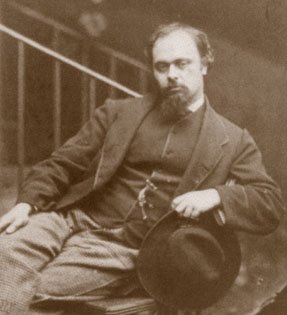9 April: Boreham on Gabriel Rossetti
 Lord of Two Hemispheres
Lord of Two HemispheresThe birthday of Gabriel Charles Rossetti suggests a pertinent inquiry. Has England ever produced a poet who, for glowing colouring and vivid imagery, can be compared with him? Like William Blake, who died at just about the time at which Rossetti was born, he was both a great painter and a great poet. It is difficult to say in which department he most excelled. Many men have become masters of one art whilst dabbling in another. But, as a rule, this secondary application of their skill has been merely a relaxation, a hobby, a sideline. We do not trouble about Michael Angelo's poems or about Dante's paintings. We fasten our attention on Michael Angelo's statues and on Dante's "Divine Comedy." But, in the case of Gabriel Rossetti, the same principle cannot be applied. Literature and art have each enthroned him.
Tennyson would not have resented a comparison of Rossetti's poems with his own; and Burne-Jones, who enjoyed Rossetti's intimate friendship, was never tired of acknowledging his indebtedness to his brilliant colleague. Nor did Rossetti keep his artistic genius and his poetic genius in watertight compartments. They overflowed freely into each other. There is rhythm and music and harmony in his paintings; there is life and colour and vividness in his poems. Lord David Cecil declared that some of his best poems are on canvas, whilst some of his best paintings are in verse. As typical of the latter, he instances the stanzas that depict the hushed and dimly-lit room in which a young woman nurses her sick sister.
Her little work table was spread
With work to finish. For the glare
Made
by her candle, she had care
To work some distance from the bed.
To have won so exalted a place in both hemispheres of achievement represents a record of which any man in any age might very well be proud.
Choice Artistry Matched By Fine Personality
Nor are these Rossetti's only claims upon our grateful veneration. He was essentially a personality. The trusted and intimate associate of men like Holman Hunt, John Ruskin, George Meredith, William Morris, Algernon Swinburne, and Hall Caine, he cut a striking figure among the most eminent Victorians. Indeed, his life story possesses all the features of a great romance. As a youth, he was said to be the very image of John Keats. A certain ascetic appearance, which characterised his earlier years, vanished as time went on; he assumed comfortable proportions; became, in actual fact, a trifle stout; but, to the last, his finely chiselled face, his massive forehead, and his clear grey-blue eyes, full of dreamy contemplation and profound penetration, stamped him as a man of the highest culture and refinement.
His career opened and closed dramatically. Perusing, in a magazine, a ballad that powerfully appealed to him, he determined to write to the author, Mr. William Bell Scott, enclosing some of his own verses. Mr. Scott was deeply impressed by the merit of the fragmentary manuscripts, and resolved, when next in London, to call on his enthusiastic young correspondent. To his astonishment, he found him sharing a studio with Holman Hunt. Both painters were engaged upon their first pictures; Rossetti's work seemed to Mr. Scott by far the more arresting of the two. He immediately transferred his wondering admiration from the manuscript that he carried in his pocket to the canvas on the easel before him. From that day, the young painter-poet never looked back, although sometimes the one gift and sometimes the other held the supreme place in his ardour and industry. Men who had won renown in the salons and academies came to his rooms to inspect his pictures; men who had become famous in the literary world loudly applauded his poems.
A Dramatic Burial And Resurrection
The most notable occasion on which one side of his nature waxed whilst the other waned, was the period that followed the death of his young wife. He married Miss Elizabeth Siddall, a lady of singular sweetness and beauty, whose attractive countenance is reflected in many of the most famous paintings of the time. In the year following their marriage, Rossetti was suddenly bereft of his wife and of their infant child. In a frenzy of grief, he took all his manuscripts and laid them on his dead wife's breast. He vowed that he would never write another line. How, overtaken by so shattering a blow, could he ever again uplift his voice in song? He was 33 at the time, and for several years, he kept his word. He painted a number of his finest pictures, but the spirit of poesy seemed to have forsaken him. His lyre was mute.
At length, however, time having wrought her immemorial triumph, he shyly penned a few verses whose rich and chastened beauty so affected his friends that they began to think wistfully of the large roll of manuscripts that, for six years, had reposed in Mrs. Rossetti's coffin in Highgate Cemetery. Coaxing him into some sort of reluctant consent, the body was exhumed and the buried poems rescued. On those poems his fame must largely rest, for not long afterwards, his health began to fail, and, after tedious years, in which the tyranny of pain and the confusion of drugs played a conspicuous and melancholy part, he laid aside his laurels and his brush at the early age of 53. With his delicate and fastidious touch, his work is remarkable for its tuneful minstrelsy, its exquisite finish, its gorgeous colouring, and its dazzling imagery. The world has had greater painters and greater poets, but as Lord Leighton once declared, it has never known a man whose work in both sections of his art was marked by such irresistible fascination and such intense sincerity and fervour.
F W Boreham
Image: Rossetti


<< Home